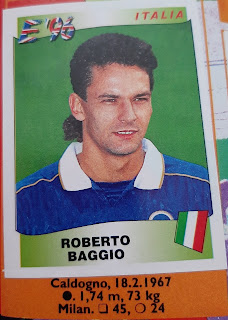19: Davor Suker, Croatia, PG Tips International Soccer Stars Picture Card Album
In the latter years of the twentieth century the emergence of counterfactual histories brought yet another subcategory to the academic discipline. Although often dismissed by the more traditional history scholars this new trend looked to answer some of the world’s great ‘what if?’ questions. Theories on what would have happened had the Nazis won the Second World War and how science might have developed without Christianity provided some interesting reading and highlighted the significance of what might have been seen as mere details at the time.
The world of sport is so often decided on fine margins that it is no surprise that footballing discourse is littered with ‘what if’ conversations and theories. What might have happened at the 1986 World Cup had Peter Shilton remembered he was capable of jumping and Diego Maradona hadn’t punched the ball over him? Would football have come home in 1996 had Gareth Southgate followed his mum’s advice and just smashed his penalty down the middle rather than rolling it softly to Andreas Kopke’s right? Back in 1992 the footballing world was left wondering what might have been had Yugoslavia not been plunged into civil war and unable to compete in that summer’s European Championship. Having won the 1987 FIFA Youth Championship the nation was blessed with a golden generation of players who had gone on to grace some of the continent’s leading club sides. Could they have won the tournament? It’s almost impossible to tell but what’s for sure is that Denmark would not have headed back over the Øresund Bridge with the trophy as they were only there due to Yugoslavia’s disqualification.
At the core of this exceptional Yugoslavian side were some incredibly gifted Croatians. The defensive smarts of Igor Stimac and Rober Jarni provided a foundation for the creative flair of Zvonimir Boban and the chainsmoking genius Robert Prosinecki who in turn created countless chances for the insatiable goalscoring talents of one Davor Suker. With Croatia only admitted into UEFA in 1993 they were unable to seek qualification for the 1994 World Cup but hit the ground running en route to Euro 96 topping their group ahead of the global showpiece’s beaten finalists Italy. Suker was in imperious form with twelve goals in ten appearances.
He continued his goalscoring exploits in England with three in four as Croatia reached the quarter-finals before being knocked out by eventual winners Germany. The best of these was probably his second against reigning champions, and aforementioned beneficiaries of Yugoslavia’s military turmoil, Denmark. Peter Schmeichel had done the right thing in coming up for a corner in the last minute but found himself racing back as the Danes butchered the set piece. Soon to be Derby County man Aljosa Asanovic found Suker with an exceptional long ball which the striker took in his stride towards goal. He could have pinged it towards the empty net but instead waited for Schmeichel to get back in position before delicately chipping the keeper from the edge of the box.
Suker netted four more international goals to help Croatia reach the 1998 World Cup finals in France and contributed fifteen strikes in Real Madrid’s Champions League winning campaign. Such form made him a worthy candidate for a place in the coveted PG Tips International Soccer Stars Picture Card Album but it’s fair to say that the leading purveyors of hot beverages and pundits alike couldn’t have predicted the impact the Croat and his team-mates would have on the tournament. Suker scored crucial goals in Croatia’s group stage wins over Jamaica and Japan before notching his third of the tournament from the penalty spot to dispatch the newly bleached blonde Romanians in the second round. Croatia then gained revenge for Euro 96 in emphatic style with a 3-0 thrashing of Germany where Suker was once again on the scoresheet to set up a semi-final against the hosts. He gave his country the lead just after half-time but, despite some high class shithousery from Slaven Bilic to get Laurent Blanc sent off, two goals from Lilian Thuram turned the tide in favour of the eventual tournament winners. Undeterred the striker was on target once more in the third place play-off against the Netherlands and headed home with the Golden Boot.
In part due to their iconic checkerboard kits, but more down to their exceptionally talented squad, Croatia had established themselves as one of the leading lights in European football. All things must pass, however, and the turn of the century saw the gradual dismantling of one of the most entertaining sides in the game. Suker scored a further four goals during their qualifying campaign for Euro 2000 but ultimately draws against a yet-to-be renamed Yugoslavia cost them a place in the final tournament. After brief spells in England with Arsenal and West Ham United he saw out his career in Germany with 1860 Munich finishing up with an impressive record of 240 goals in 527 club games alongside a staggering 45 in 69 for Croatia. Twenty years after their exploits in France the Croatian national team went one better than Suker’s contemporaries when they reached the 2018 World Cup final but once again fell to defeat against Les Bleus. We’ll never know what might have happened if Yugoslavia had taken part in Euro 92 but it’s fair to say that it’s worth keeping an eye on their offspring this time around.





Comments
Post a Comment